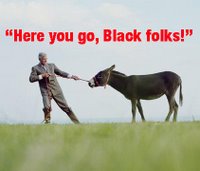
What do black people think of reparations? Time for honest talk
BY LAURA WASHINGTON
Reparations. Lately there’s been a lot of chatter. If there is one true thing that nobody, but nobody agrees on, it’s slave reparations. Is it valid? Is it too late? What form should it take? Is it just for African Americans? What about Native Americans, Chinese Americans, Latinos, Jews?
My intuition says that most African-American leaders have no clue about what their constituents think on the issue. Conversely, they know the consequences of their advocacy of reparations. Just ask U.S. Rep. Harold Ford, the Democratic U.S. Senate candidate from Tennessee. Just don’t ask him now, unless you’ve got a stopwatch handy to time how many milliseconds it takes him to sprint for the door.
Just ask the eloquent and loquacious Sen. Barack Obama about reparations and wait for the double-talk and obfuscation. He’s way too smart and ambitious to give you a straight answer on that one.
So what do black folks on the street think? An unscientific sampling last week supports my supposition: Reparations mean very different things to different people.
“I feel more job opportunities should be given to blacks and Hispanics,” said Dechaun Grant, an African-American youth on his way home from school one recent sunny afternoon.
Riding the No. 74 CTA bus, Susan Watts argued that “you have to compensate all groups if you compensate one.” Stylish and 40-something, Watts added, “Black leaders should be more forward-looking, policy-wise.”
“I think we’re entitled, but I don’t know what we’re entitled to,” said North Side doorman Robert “Hamp” Hampton, 70.
O-Neal Banks has been driving a Chicago cab since 1963. On a cross-town ride the other day he told me to forget about reparations. “It will never happen,” he said. Banks, 68, adds that he would settle for an “‘I’m sorry’ from the president -- any president -- of the United States. If he would say, ‘I am sorry this happened to you.’”
That won’t happen either, he says. “You’ll never get a white president to say it.”
So who are the real leaders on this issue? Is it the elected officials? Are the Joe Blows of the world behind the issue? My take is that a vague and amorphous group of self-appointed and to some extent self-interested people are coming together to drive this issue. Regardless of the larger consequences, this national network of advocates has coalesced around the belief that some form of compensation is due African Americans for their sufferings and tribulations.
That’s fine. If, however, we are to have an intellectually honest debate about reparations (and we must), we have to first ensure that the cause is not hijacked by opportunists who think that getting a few thousand bucks will wipe away the socio-political crisis in black America.
There are scholars and activists who have done diligent research and asked probing questions on the issue. Harvard Law School Professor Charles Ogletree has donated much time to the cause. Randall Robinson, the internationally known founder of TransAfrica, has been toiling away on the reparations territory for decades.
Yet it’s the “20 acres and a Lexus” crowd that, fairly or not, is creating the perception that the reparations movement is just about one more government cheese handout.
It’s clear that African Americans are not united on the issue. How can we expect, as a multifaceted minority group, to persuade the Powers That Be to seriously consider the cause when we are not together on it? When many of us cannot acknowledge that the maladies that haunt our community are often perpetrated by us?
After all, it was black African tribes -- not just our long-ago “slave masters” -- who participated in and profited from the abominable slave trade. Maybe we need to know a little bit more about our history before we try to get compensated for it.
I suspect that if we honestly discussed this, without thought to personal profit or gain, we might learn that as William Shakespeare says, “It is not in the stars to hold our destiny but in ourselves.”
Or as the cabbie-poet O-Neal Banks puts it, “I already got my reparations. I sent my kids to school.” One daughter is a teacher, another is a lawyer. His son is a military man. “That’s my reparations.”

No comments:
Post a Comment